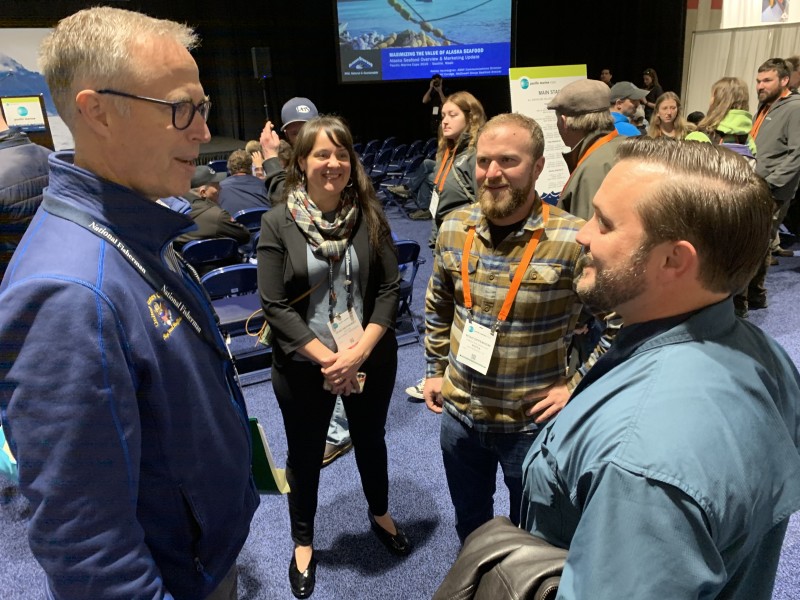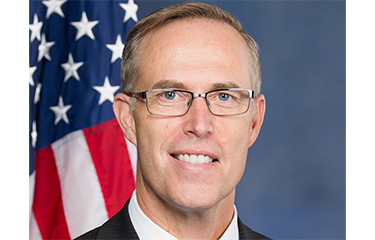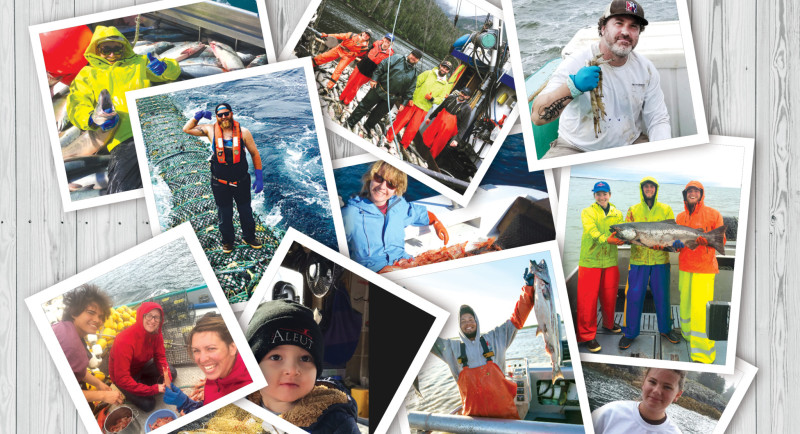Reps. Jared Huffman (D-Calif.) and Ed Case (D-Hawaii) introduced the Sustaining America’s Fisheries for the Future Act, a bill to amend and reauthorize the Magnuson–Stevens Fishery Conservation and Management Act, on Monday, July 26.
Some of the most significant updates include mandating assessments for fisheries’ climate readiness at the council level, changing the term “overfished” to “depleted,” streamlining access to disaster relief funds, increasing funds to support seafood marketing and working waterfronts, and improving flexibility on rebuilding timelines for certain stocks.
“We’re not just reauthorizing a really important law. We’re trying to reset a really important process,” Huffman told National Fisherman. “Through our stakeholder-driven, science-based approach, we have crafted legislation that rises to the challenges of the 21st century and includes critical updates to this landmark law,” he added in a release with the legislation on Monday.

Huffman, who serves as chairman of the House Natural Resources Subcommittee on Water, Oceans, and Wildlife, conducted a yearlong tour consisting ofeight listening sessions at fishing ports on every coast of the country. He and Case, a subcommittee member, introduced adiscussion draft of thereauthorization in December.
The revamped bill incorporates more changes following feedback on the draft. Huffman, Case and their staffs took additional input from stakeholders and industry leaders in the intervening months to ensure that the bill meets the needs of the industry while also propelling fishery management into the modern era and allowing flexibility for each region to manage fisheries based on local needs.

“You really have to do a deep dive and listen to everyone and think through the different proposals, including unintended consequences,” Huffman told NF. “The goal throughout has been to modernize and improve without doing harm.”
Huffman acknowledges that the dance between balancing regional needs and mandating national standards is bound to create some strife at the council and local levels, as well as between regions, specifically when it comes to rebuilding timelines.
“There have been some stakeholders in some regions calling for flexibility, feeling like some of the framework is too rigid or arbitrary,” Huffman told NF. “But I think there’s also very broad consensus that if you take the scientific rigor and the teeth out of the framework, you’re going to be on the fast track to overfishing. So that’s a tricky balance to strike. And we’ve really tried to hang onto the rigor, that I think is really one of the keys that has made Magnuson successful. There are different biological factors with some fisheries. What we’ve tried to do is allow for the special circumstances of some species and some fisheries without pulling too many threads out of the framework.”
Huffman noted that though feedback varied by region, there were some consistent themes.
“We heard concerns about climate change everywhere,” Huffman told NF. “But the concerns are different depending on where you are. So in the North Atlantic, it’s ground zero for shifting stocks. Back when Magnuson was written and reauthorized, nobody was thinking about that. Even though it’s a really good policy framework that’s stood the test of time. It’s not set up to deal with shifting stocks driven by climate change. So we have to tackle that.”
The councils remain as the standard-bearers in the management process, including determining how new data is used to support or restrict federal fisheries, a concern for some regions that are witnessing rapidly shifting stocks and other climatic changes.
“That’s going to depend on the circumstances in that particular region and that particular fishery. The main thing is to get the data to make sure it’s honest and vetted and transparent. And so we focus on the process,” Huffman told NF. “I can’t tell you how the outcomes will reshape winners and losers. That will be up to the councils.”
Better science and data have been the rallying cry of fishermen around the country for more than a decade. Recognition of climatic shifts has opened the door to legislate improving scientific standards across the board.
“Rigorous science and accountability across all sectors should be the first response to the call for developing climate-ready fisheries,” said Chris Brown, Rhode Island commercial fisherman serving as president of the Seafood Harvesters of America.
Brown also called out the now widely recognized value of domestic seafood and the importance of balancing fisheries access with industrial scale development of the ocean.
“The concept of our Blue Economy didn’t exist during the last reauthorization; now, we must ensure that the impacts of the ever-quickening pace of development in our nation’s ocean and its impacts are accounted for in our management system,” said Brown. “Otherwise, we risk wasting the incredible investments we have made over the last four decades to improve the health of our fisheries resources and ocean.”
Huffman notes that bringing fishing communities and federal managers to the table is the first step, specifically regarding the development of offshore wind power.
“Right now, NOAA Fisheries doesn’t really have the authority to be at the table on offshore wind. But they should be. And so should local fishing communities in these conversations,” Huffman told NF. “I think one of the most important components is trying to put some teeth into essential fish habitat. I’m a big advocate for the folks who make their living on the water. I’m also a big advocate for offshore wind. I don’t think we have to choose between those two things. I think we just need to do the hard work of making sure they move forward together without picking winners and losers. ”
In keeping with the theme of accuracy comes a terminology change, as well. In NOAA’s annual reports on fishery status, the term “overfished” has long been used to describe any fishery whose biomass is below the maximum sustainable yield. That term, however, has been applied whether the biomass has been affected by climatic changes, natural or man-made disasters, agricultural runoff, red tide, or any variety of stressors unrelated to fishing. That would change under this bill.
“Overfished becomes depleted, Huffman told NF. “It still has the same force in effect. But it doesn’t disparage fishermen in situations where a fishery is crashing because of non-fishing impacts.”
Huffman heard many examples on his tour to support making this change.
“It came up especially with West Coast salmon fishermen, who through no fault of their own have had to idle their boats a lot in recent years. And you’ve got a terribly depleted fish. It’s overdammed and vulnerable to impacts that have nothing to do with fishing,” Huffman told NF. “So I was quite sympathetic to their point that that term is disparaging, it’s loaded, and it’s inaccurate. It doesn’t even remotely describe what’s going on in that fishery.”
The bill has been supported broadly by fishing associations, whose feedback was critical to this final version.
“Representative Huffman and his staff worked incredibly hard to hear directly from fishermen and fishing communities to build the foundation of this draft, and we want to thank him for his dedication to a comprehensive process even through the covid-19 pandemic,” said Ben Martens, executive director of the Maine Coast Fishermen’s Association.
“The bill incorporates language that provides much needed support for working waterfronts by allocating funding and resources to improve coastal infrastructure and confront the growing threats of climate change,” said Robert C. Vandermark, executive director of the Marine Fish Conservation Network. “This bill also recognizes the need for accurate, timely, and verified catch data for all major commercial and recreational fisheries and includes measures to modernize data collection methods and utilize electronic technologies to improve catch accounting, particularly in the recreational sector.”
“While this bill addresses many pressing issues, including climate-ready fisheries, recreational fisheries data collection, and the use of electronic technologies, there remain outstanding issues that we look forward to addressing with Rep. Huffman and his staff in the coming weeks as the bill moves through the legislative process,” said Leigh Habegger, executive director of Seafood Harvesters of America. “Rep. Huffman has been a staunch supporter of healthy fisheries resources, coastal communities, and marine environments. And we have no doubt he will continue to balance the needs of the fisheries, fishing businesses, and ocean as we continue working on this bill.”
“We are heartened to see additional measures that ensure council members’ votes are transparent and clearly documented for the public benefit,” said Eric Brazer, executive director of the Gulf of Mexico Reef Fish Shareholders’ Alliance. “The Gulf of Mexico continues to struggle with managing its private angler sector. We are learning that a lack of comparable and consistent recreational datasets may be masking massive overfishing by this user group. We hope the Sustaining America's Fisheries for the Future Act can help address this problem, leading to more efficient management and continued improved access for private anglers that won’t risk the rebuilding progress we have made; or take opportunities away from highly-accountable commercial fishermen.”
The Magnuson–Stevens Fishery Conservation and Management Act was enacted in 1976 and was last reauthorized in 2006. It is the primary law that governs marine fisheries management in U.S. federal waters.







